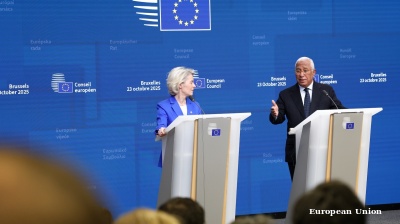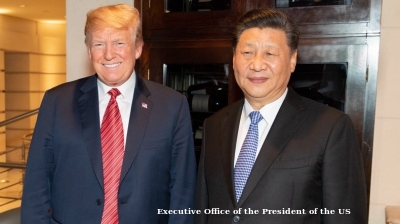The Frankfurt am Main Regional Court revoked the validity of search warrants used to raid the luxury home of Uzbek-born Russian tycoon Alisher Usmanov, Der Spiegel reported on May 26.
The court said the warrants used to raid Usmanov’s homes in Germany as part of a money-laundering investigation were "illegal". Prosecutors claim that Usmanov avoided paying over €100mn of personal income tax to German authorities.
Other charges levelled by the German prosecutor include money-laundering, avoiding personal income taxes, failure to declare assets and violating EU sanctions rules.
Usmanov is one of Russia’s wealthiest men and was placed on UK and US sanctions lists last year. He has denied that he is “close to the Kremlin” and now lives in Tashkent, Uzbekistan, where he has become a major investor into that country’s ongoing transformation. The authorities in Uzbekistan have called on the West to lift sanctions on Usmanov.
The Frankfurt court’s decision undermines the German prosecutor’s tax investigation by declaring the search warrants, which were issued in September 2022 by the Frankfurt am Main District Court, to be “groundless”.
German prosecutors raided two of Usmanov’s properties in Rottach-Egern, his super-yacht Dilbar moored in the northern German port of Bremen, and another apartment near Frankfurt am Main.
German law enforcement officials, involving numerous police and investigative officers, searched the properties in September last year.
During the searches, a private apartment belonging to the son of a deceased friend of Usmanov was also raided, as authorities suspected him of aiding and abetting money laundering due to financial support provided by Usmanov to buy his apartment in 2020. Usmanov’s representatives claim that the funds used to buy the apartment had been properly taxed, and provided documentation to support the claim.
The German Regional Court ruled on May 12 that the search warrants were issued with “significant legal deficiencies” and “lacked the minimum required justification for suspicion of a crime.”
"It was not adequately described why the investigators suspected Usmanov of money laundering. The accusation that his billions in assets are based primarily on crimes committed in Russia is too general. More general references to potentially dubious business practices and offshore companies alone were not enough," Der Spiegel reported.
The Court rejected materials that likely originated from unverified sources and internet publications as justifications, as they failed to provide any indirect evidence of Usmanov's involvement in the alleged crimes, Der Spiegel reported.
In addition, the judges criticised the fact that the investigators had based their arguments heavily on a YouTube video by Russian opposition figure Alexei Navalny, Der Spiegel added, and the prosecutors had not presented any other evidence of improper business practices.
The case has been closely followed in Germany. Following the raids, German prosecutors failed to bring formal charges against Usmanov and have released no evidence to support their claims.
Der Spiegel ran an investigation and were invited to participated in the September raids by investigators to report on the affair. An investigation by the German outlet Berliner Zeitung questioned the investigation, saying there was no evidence to support the claim that Usmanov had spent more than 182 days in Germany, or to support the other allegations.
A representative of Usmanov’s defence team said: “The Court’s decisions reaffirm our client’s trust in Germany as a functioning constitutional state. The decisions themselves, but even more so the wording of the reasoning given by the judges, should offer food for thought not only to the Public Prosecutor’s Office and the investigative authorities responsible, but also to everyone who contributed to creating a prejudiced view towards our client throughout Germany.”
The Frankfurt court decision reinforces the notion that the criminal investigation against Usmanov is “futile and politically motivated, lacking substantial evidence to support the attributed crimes,” Usmanov’s lawyers said. Additionally, the properties and the yacht linked to Usmanov are actually owned by irrevocable trusts and not Usmanov personally, the lawyer said.
Usmanov’s defence team highlighted that the participation of the press in the raids on Usmanov’s properties shows the investigation was accompanied by a media campaign that promulgated “unfounded speculation” about Usmanov’s affairs, but that the decision of the court has gone someway to retractions and corrections by German authorities and media.
As a result of the decision the German Federal Criminal Police Office (BKA) has removed its online press release about the searches conducted on the Dilbar super-yacht, which have been judged illegal by the Regional Court. Similarly, the Munich Public Prosecutor's Office has retracted its official press release regarding the searches at the two properties. Several major German media outlets have also rectified or removed articles as inaccurate, that claimed the property and yacht belonged to Usmanov as a result of the court decision.
Dr. Peter Gauweiler, a former minister in the Bavarian government, and Prof. Dr Thomas Fischer, a former judge of the German Supreme Court, who legally represent the Embassy of Uzbekistan in the Federal Republic of Germany, said: “The conclusions of the appellate court confirm the view which we repeatedly expressed to the German federal government… that the actions of the German investigative authorities against Mr. Usmanov are not objectively justified but are in fact politically motivated.”
“We see in the decisions of the Frankfurt Regional Court unequivocal evidence that our concerns and warnings to the German Federal Government regarding the disproportionate actions of the German investigative authorities against Mr. Usmanov were not groundless. We expect Germany to compensate the damage caused by the unlawful investigative actions and to provide clarifications on the recognition of all investigative actions conducted as illegal to the same media outlets to which information about those actions had been sent previously,” the two men said in a statement.
The Frankfurt court's decisions are final and cannot be appealed against.
Although a victory for Usmanov, the decision is not the end of his troubles in German, where other investigations are ongoing. Most recently, the District Court of Munich rejected Usmanov's complaint against the raids in proceedings for violations of sanctions.
News
_1761305900.jpg)
Latin America edges up growth forecasts but remains trapped in low gear, ECLAC says
Latin America and the Caribbean will expand 2.4% this year, the Economic Commission for Latin America and the Caribbean said, marking the second upward revision since April but pointing to the region's struggle to escape chronically weak growth.

Palestinian ambassador pledges Iraqi embassy in Jerusalem
Palestinian ambassador pledges to open Iraqi embassy in Jerusalem as Iraq lays foundation stone for Palestinian ambassador's residence in Baghdad's new diplomatic quarter covering 300 hectares.

EU pledges ongoing support for Ukraine, defers decision on Russian assets
European Union leaders pledged continued financial backing for Ukraine over the next two years, but delayed a decision on tapping billions of euros in frozen Russian assets to fund Kyiv’s defence

Trump Administration striving to strike critical minerals deal with Kazakhstan
Pushing for US firm to win rights to develop major tungsten deposits.




